On 1 October, the National Day of the People’s Republic of China, the University of Macau (UM) National Flag Team held a solemn flag-raising ceremony. With great reverence, they escorted the national flag of China, the regional flag of the Macao SAR, and the UM flag in perfect unison, their strides echoing powerfully as they made their way towards the flagpole on the UM campus. As the team captain commanded, ‘Salute to the national flag’, the three flags were raised slowly. Faculty and students watched with deep respect. This flag-raising ceremony is just one of the ways UM students express their patriotism. Students also celebrate their love for the country through art, writing, videos, and tour guiding.
Exploring the depths of culture
Planting the seeds of patriotism in the hearts of students is similar to introducing them to Chinese tea ceremonies, or cha dao—both start with understanding the depths of culture. Alfred Wong Seng Fat, interim college master of Cheng Yu Tung College (CYTC) at UM, uses cha dao as a method to promote patriotic education. He performs the art of tea in his college at every university Chinese cultural festival. Prof Wong meticulously selects tea seats and tea sets that complement the character of the chosen tea leaves, and enhances the ambience with floral arrangements. The entire process, from tea preparation and brewing to tasting, is executed with great attention to detail. He explains, ‘Cha dao is a philosophy of beauty that originated in China before the Qin Dynasty and was particularly celebrated during the Tang and Song Dynasties. It emphasises tea ethics, tea etiquette, and tea art. Moreover, it reflects the deep spiritual pursuits of the Chinese nation.’
At a recent cultural festival, as Prof Wong started the tea ceremony, the inviting aroma quickly drew the attention of an exchange student from the Netherlands. Noticing her interest in Chinese tea culture, Prof Wong began to explain the knowledge about tea brewing in English while performing, allowing students to gain a deeper understanding of the profound art of cha dao.
UM’s residential colleges actively incorporate elements that promote and preserve Chinese culture as a means to enhance patriotic education and deepen students’ cultural knowledge. In addition, Prof Wong believes that emotions without a foundation are unsustainable. In light of this, CYTC is committed to enhancing students’ understanding of the richness of Chinese culture.
CYTC also organises activities to help students connect with their heritage. For example, the college arranges visits to the Historical Centre of Macao, where students can explore the mysteries of Macao’s world heritage sites. Students also have the opportunity to visit the Handover Gifts Museum of Macao, and the ‘Love the Country, Love Macao Educational Base for the Youth’. In addition, the college encourages students to travel across China to witness first-hand the country’s social and economic development and to deepen their understanding of the historical connections between Macao and broader national development.
Prof Wong says, ‘The profound significance of culture often evokes emotional resonance. When we truly understand a place, it is easier to form an emotional connection with it.’
Understanding homeland through writing
‘After the handover, Macao has experienced explosive development. However, most people only focus on the glamourous buildings and have overlooked the uniqueness of this small city,’ says Dai Ziyi as she shares her observations of Macao and her reflections on the book Invisible Macau: The Ignored City and Culture. A fourth-year student in the Faculty of Education (FED), Dai believes that although Macao may not have the historical depth of Luoyang City in Henan Province, which served as the capital city of nine ancient Chinese dynasties, the small city played a pivotal role as a gateway for exchanges between Chinese and Western civilisations. She also highlights the significance of examining the collision and integration of Chinese and Western cultures in modern history through the lens of Macao.
In her first year, Dai met Gong Yingxue, associate master of CYTC, who has since become a pivotal figure in her academic journey. Prof Gong encouraged Dai to participate in essay competitions. Through writing, Dai has been able to express her affection for and reflections on Macao and the country. Her book reflection recently earned her the runner-up title in the university category of the Macao Literature Review Contest.
This semester, Dai is participating in an internship at Macao Hou Kong Middle School, where she is using her experience to teach students the value of reflection through writing. Moreover, Dai encourages her students to explore their hometowns more thoroughly, which she believes will deepen their sense of belonging to both Macao and the country.
Prof Gong actively encourages students to participate in essay competitions about patriotism. Over the past two years, students from CYTC have produced more than 20 award-winning essays. The college has compiled these works and is preparing to publish them in a book titled Rich Cultural Refinement—A Collection of Award-Winning Essays on Patriotism from Cheng Yu Tong College of the University of Macau. Prof Gong explains, ‘We motivate students to participate in these essay competitions to deepen their understanding of the history and culture of the country and Macao. Through research, reflection, and writing, students not only showcase their writing talents, but also naturally express their affection for their hometown and country. This approach also serves as a subtle yet effective educational process.’
Capturing life in Hengqin through a camera
Aiden Ng, a second-year student in the Department of Communication, documents his everyday life in Hengqin through vlogs and short films. Since moving to the ‘Macau New Neighbourhood’ in Hengqin last year with his family, Aiden has experienced first-hand the integrated development of Macao and Hengqin.
Aiden turned his experiences in Hengqin into a short film titled Become a Family. Last month, this production beat other entries in the ‘Introduction to Law—Microfilm Creation Competition for Macao College Students’ organised by the Education and Youth Development Bureau and won both the gold award and the best screenplay award.
As a new resident in Hengqin, Aiden has witnessed the continuous improvements in the living environment and community infrastructure on the island. As a journalism student, he closely follows current affairs, particularly policies related to the integration between Macao and Hengqin. For example, a policy was introduced in March this year to allow Macao residents to transport their pets to Hengqin without import licenses or relevant declarations. This measure enabled Aiden to bring his beloved cat to his new home in Hengqin, which subsequently inspired his short film Become a Family. ‘Living in Hengqin feels like being part of a family,’ he shares. ‘This place also exemplifies the vitality of the “one country, two systems” policy.’
While Aiden enjoys documenting Macao’s development through his camera, he recognises the importance of understanding policies and laws to seizing future opportunities. He enhances his knowledge through UM’s general education course ‘Ethics, Values, Law and Society’ as well as seminars offered by residential colleges.
‘We place emphasis on enhancing students’ understanding of China’s political system, the Macao SAR’s high degree of autonomy, and their relationships,’ says Jiang Chaoyang, director of the Centre for Constitutional Law and Basic Law Studies at UM. The centre is committed to promoting knowledge of the Constitution of the People’s Republic of China and the Basic Law of the Macao SAR. To this end, a general education course on these two laws has been introduced for students outside the law discipline. Prof Jiang believes that understanding these laws and the fundamentals of the legal systems of Macao and mainland China will equip students to live or work in the Greater Bay Area and other mainland cities in the future, thereby facilitating their integration into the country’s development.
Learning the Constitution and the Basic Law through games
During her third year of undergraduate studies at UM, Xia Wenxin served as a ‘two laws ambassador’ of the university (‘two laws’ refer to the Constitution of the People’s Republic of China and the Basic Law of the Macao SAR), where she guided fellow students from Choi Kai Yau College (CKYC) through the exhibitions in the Commemorative Galley of the Macao Basic Law. To prepare for this role, Xia and another ambassador visited the gallery in advance to familiarise themselves with the historical relics and important documents on display. Their thorough preparation was well-received, earning them very positive feedback on their tours. Now a postgraduate student in FED and a resident assistant in CKYC, Xia continues to promote the Constitution and the Basic Law.
Sun Sisi, resident fellow in Lui Che Woo College and coordinator of the RCAT (Residential College Academic Tutorial) programme on two laws promotion, emphasises that ‘two laws ambassadors’ must be adept at explaining and promoting the Constitution and the Basic Law to their peers. She notes, ‘These ambassadors, who come from disciplines outside of law, are specifically chosen based on their performance in the “two laws” general education course.’
Omy Lam, a third-year student in FED, is both a ‘two laws ambassador’ and a teaching assistant in the RCAT programme. She shares an innovative teaching method: ‘We have created a “Two Laws Monopoly” game, which maintains the classic rules of Monopoly but incorporates knowledge of the two laws. Our goal is to enable students to learn and have fun simultaneously, which can enhance their understanding of the two laws and inspire them to become responsible citizens.’
Dr Sun adds, ‘The Constitution and the Basic Law contain complex principles and concepts. Peer-based teaching not only makes it easier for students to acquire knowledge of these two laws but also deepens their understanding and enhances their ability to explain them. Moreover, this teaching method helps foster an effective educational environment for learning about the two laws.’
Conveying patriotism through a different means
‘Move the index finger from your throat to just above your chest, then diagonally downward to the waist on the right side of your body. This gesture, which mimics the closure that runs from the central collar across the upper chest and curves down to the right side of a cheongsam, signifies “motherland” in sign language,’ explains Lam Cheng, a third-year student in Chinese law, as he demonstrates a sign language gesture. Recently, Lam and his fellow students from the sign language class in Moon Chun Memorial College (MCMC) have been diligently practising for their sign language performance of the patriotic song Ode to the Motherland at an upcoming high table dinner.
Lam emphasises that patriotism transcends boundaries and is not confined to spoken words. He points out that sign language is a powerful means of expression. It enables more people to convey their feelings about their home country in a way that suits them. Moreover, sign language can promote social inclusion.
To effectively perform Ode to the Motherland, it is important not only to master the sign language gestures, but also to understand the historical and cultural spirit of the song. Lam notes that the song was written and composed by Wang Xin, who was inspired by Xian Xinghai’s dedication to saving the country through music. ‘Therefore, in addition to ensuring accuracy in each gesture and facial expression during our performance, we also strive to use our body movements to enhance expression and evoke deeper emotions based on the music and the context of the lyrics,’ he explains.
‘Music itself is a powerful tool, and when combined with sign language, its impact is significantly amplified,’ says Alice Hong, resident fellow in MCMC. She says that since 2022, MCMC has collaborated with Macau Deaf Association to promote performances of patriotic songs in sign language. The partnership has resulted in student performances of Song of the Seven Sons and Joining Together as One Family. These performances are even turned into music videos, which are released every December to celebrate the anniversary of Macao’s return to the motherland.
Alice shares, ‘We hope to communicate our patriotic feelings to a broader audience by performing songs in sign language.’
Committed to cultivating patriotic talent
The fruits of teaching do not appear overnight; they require time to mature and gradually unfold. As a public higher education institution, UM recognises the importance of patriotism in talent development. The university is committed to strengthening students’ national identity and enhancing their sense of belonging to their society and country. UM will continue to cultivate a patriotic educational environment that encourages students to appreciate their own culture and empowers them to contribute to society with open minds and broad perspectives.
Text: Kelvin U, UM Reporter Wang Chuyue, Trainee UM Reporter Chen Xinjie
English translation: Bess Che
Photos: Editorial Board, with some provided by the interviewees
Source: My UM Issue 137
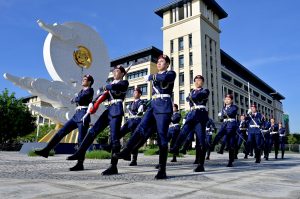
UM holds flag-raising ceremony to celebrate the National Day
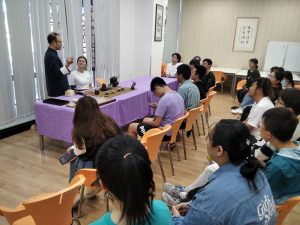
Prof Wong Seng Fat performs the art of tea in his college
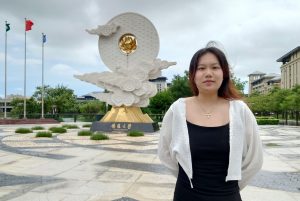
Dai Ziyi
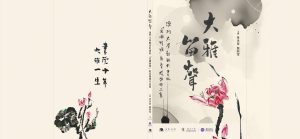
Rich Cultural Refinement—A Collection of Award-Winning Essays on Patriotism from Cheng Yu Tong College of the University of Macau
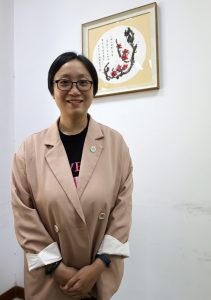
Prof Gong Yingxue
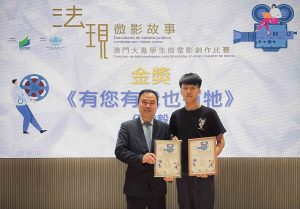
Aiden Ng wins both the gold award and the best screenplay award in the ‘Introduction to Law — Microfilm Creation Competition for Macao College Students’
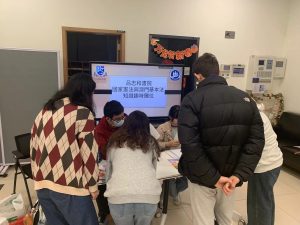
Students promote the Constitution and the Basic Law through games
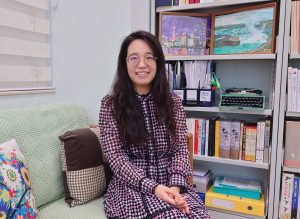
Dr Sun Sisi
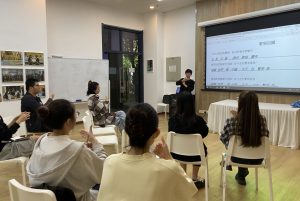
RC promotes performances of patriotic songs in sign language

Alice Hong
